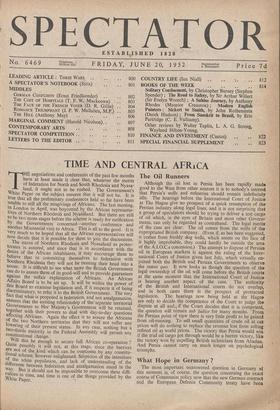TIME AND CENTRAL AFRICA
THE negotiations and conferences of the past few months have at least made it clear that, whatever the merits of federation for North and South Rhodesia and Nyasa- land, it ought not to be rushed. The Government's White Paper on the subject ensures that it will not be. It is true that all the preliminary conferences held so far have been unable to still all the misgivings of Africans. The last meeting, M London in April, was boycotted by the African representa- tives of Northern Rhodesia and Nyasaland. But there are still to be two more stages before the scheme is ready for ratification by the Governments concerned—another conference and another Ministerial visit to Africa. This is all to the good. It is very much to be hoped that all the African representatives will now decide that it is possible for them to join the discussions. The status of Northern Rhodesia and Nyasaland as protec- torates is assured, and since that is in accordance with the desire of the African inhabitants, it may encourage them to believe that in committing themselves to federation with Southern Rhodesia they will not be running their head into a noose. It is difficult to see what more the British Government can do to assure them of its good-will and to provide guarantees against the unfair explbitation of Africans. An African Affairs Board is to be set up. It will be within the power of this Board to examine legislation and, if it suspects it of being discriminatory, to refer it to the British Government. The very fact that what is proposed is federation, and not amalgamation, ensures that the existing relationship of the' separate territorial Governments to Her Majesty's Government will be retained, together with their powers to deal with day-to-day questions affecting Africans. Again the effect is to assure the Africans of the two Northern territories that they will not suffer any lowering of their present status. In any case, nothing but a two-thirds majority in the Federal Assembly will permit any constitutional change.' Will this be enough to secure full African co-operation ? Quite possibly it will not, at this stage, since the barriers are not of the kind which can be overcome by any constitu- tional scheme, however enlightened. Suspicion of the intentions of the white population, and lack of understanding of the difference between federation and amalgamation stand in the way. But it should not be impossible to overcome these diffi- culties, in time, and time is one of the things provided by the White Paper. 1


















































 Previous page
Previous page